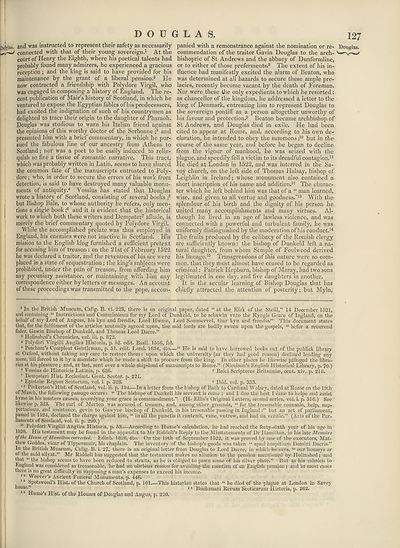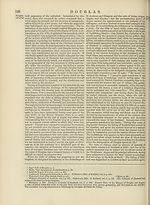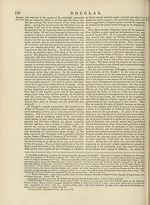Encyclopaedia Britannica > Volume 8, DIA-England
(137) Page 127
Download files
Complete book:
Individual page:
Thumbnail gallery: Grid view | List view

DOUGLAS.
jvMas. and was instructed to represent their safety as necessarily
connected with that of their young sovereign.1 At the
court of Henry the Eighth, where his poetical talents had
probably found many admirers, he experienced a gracious
reception; and the king is said to have provided for his
maintenance by the grant of a liberal pension.2 He
now contracted a friendship with Polydore Virgil, who
was engaged in composing a history of England. The re¬
cent publication of Mair’s history of Scotland, in which he
ventured to expose the Egyptian fables of his predecessors,
had excited the indignation of such of his countrymen as
delighted to trace their origin to the daughter of Pharaoh.
Douglas was studious to warn his Italian friend against
the opinions of this worthy doctor of the Sorbonne ;3 and
presented him with a brief commentary, in which he pur¬
sued the fabulous line of our ancestry from Athens to
Scotland; nor was a poet to be easily induced to relin¬
quish so fine a tissue of romantic narrative. This tract,
which was probably written in Latin, seems to have shax-ed
the common fate of the manuscripts entrusted to Poly¬
dore ; who, in order to secure the errors of his work from
detection, is said to have destroyed many valuable monu¬
ments of antiquity.4 Vossius has stated that Douglas
wrote a history of Scotland, consisting of several books ;5
but Bishop Bale, to whose authority he refers, only men¬
tions a single book;6 and it is evident that the historical
work to which both these writers and Dempster7 allude, is
merely the brief commentary quoted by Polydore Virgil.
While the accomplished prelate was thus employed in
England, his enemies were not inactive in Scotland. His
mission to the English king furnished a sufficient pretext
for accusing him of treason : on the 21st of February 1522
he was declared a traitor, and the revenues of his see were
placed in a state of sequestration ; the king’s subjects were
prohibited, under the pain of treason, from affording him
any pecuniary assistance, or maintaining with him any
correspondence either by letters or messages. An account
of these proceedings was transmitted to the pope, accom¬
panied with a remonstrance against the nomination or re¬
commendation of the traitor Gavin Douglas to the arch¬
bishopric of St Andrews and the abbacy of Dunfermline,
or to either of those preferments.8 The extent of his in¬
fluence had manifestly excited the alarm of Beaton, who
was determined at all hazards to secure these ample pre¬
lacies, recently become vacant by the death of Foreman.
Nor were these the only expedients to which he resorted :
as chancellor of the kingdom, he addressed a letter to the
king of Denmark, entreating him to represent Douglas to
the sovereign pontiff as a person altogether unworthy of
his favour and protection.9 Beaton became archbishop of
St Andrews, and Douglas died in exile. He had been
cited to appear at Rome, and, according to his own de¬
claration, he intended to obey the summons;10 but in the
course of the same year, and before he began to decline
from the vigour of manhood, he was seized with the
plague, and speedily fell a victim to its dreadful contagion.11
Fie died at London in 1522, and was interred in the Sa¬
voy church, on the left side of Thomas Flalsay, bishop of
Leighlin in Ireland; whose monument also contained a
short inscription of his name and addition.12 The charac¬
ter which he left behind him was that of a “ man learned,
wise, and given to all vertue and goodness.”13 With the
splendour of his birth and the dignity of his person he
united many accomplishments and many virtues. Al¬
though he lived in an age of lawless violence, and was
connected with a powerful and turbulent family, he was
uniformly distinguished by the moderation of his conduct.14
The fruits produced by the celibacy of the Romish clergy
are sufficiently known: the bishop of Dunkeld left a na¬
tural daughter, from whom Semple of Foulwood derived
his lineage.15 Transgressions of this nature were so com¬
mon, that they must almost have ceased to be regarded as
criminal: Patrick Hepburn, bishop of Moray, had two sons
legitimated in one day, and five daughters in another.
It is the secular learning of Bishop Douglas that has
chiefly attracted the attention of posterity; but Myln,
1 In the British Museum, Calig. B. vi. 223, there is an original paper, dated “ at the Kirk of the Steill,” 14 December 1521,
and containing “ Instructions and Commissioun for my Lord of Dunkeld, to be schawin vnto the Kyngis Grace of Ingland, on the
behalf of my Lord of Anguss, his kyn and frendis, Lord Hwme, Lord Sommervel, thar kyn and frendis.” This document states
that, for the fulfilment of the articles mutually agreed upon, the said lords are bodily sworn upon the gospels, “ befor a reuerend
liider, Gawin Bischop of Dunkeld, and Thomas Lord Dacre.”
2 Holinshed’s Chronicles, vol. iii. p. 872.
a Polydori Yirgilii Anglica Historia, p. 52. edit. Basil. 155G, fob
4 Peacham’s Compleat Gentleman, p. 51. edit. Lond. 1G34, 4to.—“ He is said to have borrowed books out of the publick library
at Oxford, without taking any care to restore them : upon which the university (as they had good reason) declined lending any
more, till forced to it by a mandate which he made a shift to procure from the king. In other places he likewise pillaged the libra¬
ries at his pleasure ; and, at last, sent over a whole ship-load of manuscripts to Itome.” (Nicolson’s English Historical Library, p. 70.)
5 Yossius de Historicis Latinis, p. G8G. 6 Balei Scriptores Britanniae, cent. xiv. p. 218.
7 Dempsteri Hist. Ecclesiast. Gent. Sector, p. 221.
8 Epistolae Begum Scotorum, vol. i. p. 328. 9 Ibid. vol. p. 333.
10 Pinkerton’s Hist, of Scotland, vol. ii. p. 194—In a letter from the bishop of Bath to Cardinal Wolsey, dated at Rome on the 19th
of March, the following passage occurs: “ The bisbope of Dunkell his servant is come; and I doo the best I cane to helpe and assist
hyme in his masters causes, accordyng your grace is commandment.” (H. Ellis’s Original Letters, second series, vol. i. p. 316.) See
likewise p. 323. The earl of Morton was accused of treason, and, among other grounds, “ for the tresonable counsale, help, sup-
portacioun, and assistance, gevin to Gawyne bischop of Dunkeld, in his tresonable passing in Ingland:” but an act of parliament,
passed in 1524, declared the charge against him, “ in all the punctis it contenit, vane, vntrew, and had na veritie.” (Acts of the Par¬
liaments of Scotland, vol, ii. p. 290.)
11 Polydori Virgilii Anglica Historia, p. 53—According to Hume’s calculation, he had reached the forty-sixth year of his age in
1520. His testament may be found in the appendix to Mr Riddell’s Reply to the Misstatements of Dr Hamilton, in his late Memoirs
of the House of Hamilton corrected. Edinb. 1828, 4to. On the 19th of September 1522, it was proved by one of the executors, Mat¬
thew Geddes, vicar of Tippermuir, his chaplain. The inventory of the bishop’s goods was taken “ apud hospitium Domini Dacris.”
In the British Museum, Calig. B. i. 27, there is an original letter from Douglas to Lord Dacre, in which he says, “ our houssys ar
ot the auld allya’t.” Mr Riddell has suggested that the testament makes no allusion to the pension mentioned by Holinshed; and
that “ the bishop seems to have been reduced to straits, as he is obliged to pawn some of his silver plate.” But as his mission to
England was considered as treasonable, he had an obvious reason for avoiding the mention of an English pension; and in most cases
there is no great difficulty in supposing a man’s expenses to exceed his income.
12 VVeever’s Ancient Funeral Monuments, p. 44G.
13 Spotswood’s Hist, of the Church of Scotland, p. 101.—This historian states that “ he died of the plague at London in Savoy
house.” 14 Ruchanani Rerum Scoticarum Historia, p. 262.
1 s Hume’s Hist, of the Houses of Douglas and Angus, p. 220.
jvMas. and was instructed to represent their safety as necessarily
connected with that of their young sovereign.1 At the
court of Henry the Eighth, where his poetical talents had
probably found many admirers, he experienced a gracious
reception; and the king is said to have provided for his
maintenance by the grant of a liberal pension.2 He
now contracted a friendship with Polydore Virgil, who
was engaged in composing a history of England. The re¬
cent publication of Mair’s history of Scotland, in which he
ventured to expose the Egyptian fables of his predecessors,
had excited the indignation of such of his countrymen as
delighted to trace their origin to the daughter of Pharaoh.
Douglas was studious to warn his Italian friend against
the opinions of this worthy doctor of the Sorbonne ;3 and
presented him with a brief commentary, in which he pur¬
sued the fabulous line of our ancestry from Athens to
Scotland; nor was a poet to be easily induced to relin¬
quish so fine a tissue of romantic narrative. This tract,
which was probably written in Latin, seems to have shax-ed
the common fate of the manuscripts entrusted to Poly¬
dore ; who, in order to secure the errors of his work from
detection, is said to have destroyed many valuable monu¬
ments of antiquity.4 Vossius has stated that Douglas
wrote a history of Scotland, consisting of several books ;5
but Bishop Bale, to whose authority he refers, only men¬
tions a single book;6 and it is evident that the historical
work to which both these writers and Dempster7 allude, is
merely the brief commentary quoted by Polydore Virgil.
While the accomplished prelate was thus employed in
England, his enemies were not inactive in Scotland. His
mission to the English king furnished a sufficient pretext
for accusing him of treason : on the 21st of February 1522
he was declared a traitor, and the revenues of his see were
placed in a state of sequestration ; the king’s subjects were
prohibited, under the pain of treason, from affording him
any pecuniary assistance, or maintaining with him any
correspondence either by letters or messages. An account
of these proceedings was transmitted to the pope, accom¬
panied with a remonstrance against the nomination or re¬
commendation of the traitor Gavin Douglas to the arch¬
bishopric of St Andrews and the abbacy of Dunfermline,
or to either of those preferments.8 The extent of his in¬
fluence had manifestly excited the alarm of Beaton, who
was determined at all hazards to secure these ample pre¬
lacies, recently become vacant by the death of Foreman.
Nor were these the only expedients to which he resorted :
as chancellor of the kingdom, he addressed a letter to the
king of Denmark, entreating him to represent Douglas to
the sovereign pontiff as a person altogether unworthy of
his favour and protection.9 Beaton became archbishop of
St Andrews, and Douglas died in exile. He had been
cited to appear at Rome, and, according to his own de¬
claration, he intended to obey the summons;10 but in the
course of the same year, and before he began to decline
from the vigour of manhood, he was seized with the
plague, and speedily fell a victim to its dreadful contagion.11
Fie died at London in 1522, and was interred in the Sa¬
voy church, on the left side of Thomas Flalsay, bishop of
Leighlin in Ireland; whose monument also contained a
short inscription of his name and addition.12 The charac¬
ter which he left behind him was that of a “ man learned,
wise, and given to all vertue and goodness.”13 With the
splendour of his birth and the dignity of his person he
united many accomplishments and many virtues. Al¬
though he lived in an age of lawless violence, and was
connected with a powerful and turbulent family, he was
uniformly distinguished by the moderation of his conduct.14
The fruits produced by the celibacy of the Romish clergy
are sufficiently known: the bishop of Dunkeld left a na¬
tural daughter, from whom Semple of Foulwood derived
his lineage.15 Transgressions of this nature were so com¬
mon, that they must almost have ceased to be regarded as
criminal: Patrick Hepburn, bishop of Moray, had two sons
legitimated in one day, and five daughters in another.
It is the secular learning of Bishop Douglas that has
chiefly attracted the attention of posterity; but Myln,
1 In the British Museum, Calig. B. vi. 223, there is an original paper, dated “ at the Kirk of the Steill,” 14 December 1521,
and containing “ Instructions and Commissioun for my Lord of Dunkeld, to be schawin vnto the Kyngis Grace of Ingland, on the
behalf of my Lord of Anguss, his kyn and frendis, Lord Hwme, Lord Sommervel, thar kyn and frendis.” This document states
that, for the fulfilment of the articles mutually agreed upon, the said lords are bodily sworn upon the gospels, “ befor a reuerend
liider, Gawin Bischop of Dunkeld, and Thomas Lord Dacre.”
2 Holinshed’s Chronicles, vol. iii. p. 872.
a Polydori Yirgilii Anglica Historia, p. 52. edit. Basil. 155G, fob
4 Peacham’s Compleat Gentleman, p. 51. edit. Lond. 1G34, 4to.—“ He is said to have borrowed books out of the publick library
at Oxford, without taking any care to restore them : upon which the university (as they had good reason) declined lending any
more, till forced to it by a mandate which he made a shift to procure from the king. In other places he likewise pillaged the libra¬
ries at his pleasure ; and, at last, sent over a whole ship-load of manuscripts to Itome.” (Nicolson’s English Historical Library, p. 70.)
5 Yossius de Historicis Latinis, p. G8G. 6 Balei Scriptores Britanniae, cent. xiv. p. 218.
7 Dempsteri Hist. Ecclesiast. Gent. Sector, p. 221.
8 Epistolae Begum Scotorum, vol. i. p. 328. 9 Ibid. vol. p. 333.
10 Pinkerton’s Hist, of Scotland, vol. ii. p. 194—In a letter from the bishop of Bath to Cardinal Wolsey, dated at Rome on the 19th
of March, the following passage occurs: “ The bisbope of Dunkell his servant is come; and I doo the best I cane to helpe and assist
hyme in his masters causes, accordyng your grace is commandment.” (H. Ellis’s Original Letters, second series, vol. i. p. 316.) See
likewise p. 323. The earl of Morton was accused of treason, and, among other grounds, “ for the tresonable counsale, help, sup-
portacioun, and assistance, gevin to Gawyne bischop of Dunkeld, in his tresonable passing in Ingland:” but an act of parliament,
passed in 1524, declared the charge against him, “ in all the punctis it contenit, vane, vntrew, and had na veritie.” (Acts of the Par¬
liaments of Scotland, vol, ii. p. 290.)
11 Polydori Virgilii Anglica Historia, p. 53—According to Hume’s calculation, he had reached the forty-sixth year of his age in
1520. His testament may be found in the appendix to Mr Riddell’s Reply to the Misstatements of Dr Hamilton, in his late Memoirs
of the House of Hamilton corrected. Edinb. 1828, 4to. On the 19th of September 1522, it was proved by one of the executors, Mat¬
thew Geddes, vicar of Tippermuir, his chaplain. The inventory of the bishop’s goods was taken “ apud hospitium Domini Dacris.”
In the British Museum, Calig. B. i. 27, there is an original letter from Douglas to Lord Dacre, in which he says, “ our houssys ar
ot the auld allya’t.” Mr Riddell has suggested that the testament makes no allusion to the pension mentioned by Holinshed; and
that “ the bishop seems to have been reduced to straits, as he is obliged to pawn some of his silver plate.” But as his mission to
England was considered as treasonable, he had an obvious reason for avoiding the mention of an English pension; and in most cases
there is no great difficulty in supposing a man’s expenses to exceed his income.
12 VVeever’s Ancient Funeral Monuments, p. 44G.
13 Spotswood’s Hist, of the Church of Scotland, p. 101.—This historian states that “ he died of the plague at London in Savoy
house.” 14 Ruchanani Rerum Scoticarum Historia, p. 262.
1 s Hume’s Hist, of the Houses of Douglas and Angus, p. 220.
Set display mode to:
![]() Universal Viewer |
Universal Viewer | ![]() Mirador |
Large image | Transcription
Mirador |
Large image | Transcription
Images and transcriptions on this page, including medium image downloads, may be used under the Creative Commons Attribution 4.0 International Licence unless otherwise stated. ![]()
| Encyclopaedia Britannica > Encyclopaedia Britannica > Volume 8, DIA-England > (137) Page 127 |
|---|
| Permanent URL | https://digital.nls.uk/193324786 |
|---|
| Attribution and copyright: |
|
|---|
| Description | Ten editions of 'Encyclopaedia Britannica', issued from 1768-1903, in 231 volumes. Originally issued in 100 weekly parts (3 volumes) between 1768 and 1771 by publishers: Colin Macfarquhar and Andrew Bell (Edinburgh); editor: William Smellie: engraver: Andrew Bell. Expanded editions in the 19th century featured more volumes and contributions from leading experts in their fields. Managed and published in Edinburgh up to the 9th edition (25 volumes, from 1875-1889); the 10th edition (1902-1903) re-issued the 9th edition, with 11 supplementary volumes. |
|---|---|
| Additional NLS resources: |
|

